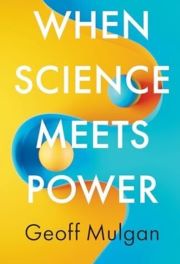When Science Meets Power

Geoff Mulgan
Polity Press, £25.00
In this readable and thought-provoking book, Mulgan explores how science can help politics achieve its goal of a good life for the whole community. He also explores the converse: how science must be guided by politics. Science often portrays itself as the disinterested pursuit of curiosity but, in reality, the impact of politics ranges from funding allocation to legal codes of practice.
He concludes that politics needs to radically change in order to govern science effectively. One major disconnect is that resources are not directed to the issues that matter the most – there is a striking mismatch between the Sustainable Development Goals and the priorities of science and technology, for example.
Changes are also needed to help science effectively feed into politics. We can create powerful institutions committed to truth, equipped to guide political decisions. We can create media and education systems that are open and truthful. We can also change the roles of scientists, and encourage them to think and act more ethically.
A key message is that we don’t simply need more government scientific advisers. Such advisers often have deep knowledge about their subject area, which is essential but not sufficient. We need people who are skilled at synthesising knowledge, understanding both the scientific and political dimensions of the challenges we face. We need people who can both zoom out to see how whole systems work and zoom in to the practical challenges of change.
As well as highlighting the fundamental importance of science and technology to our society, the book’s messages are also a humbling reminder of our limitations as scientists. In the Covid-19 pandemic, for example, scientists provided essential data but couldn’t weigh up physical health with mental health, the economy or education.
Science itself also has limitations. We have seen amazing scientific advances that are viewed as positive, yet they do not always result in better wellbeing or positive environmental change, with scientific progress contributing to problems ranging from climate change to poor diets to the harmful effects of social media.
Ultimately, science and power are entwined, and When Science Meets Power provides valuable insights into how we can make the relationship more effective.
Dr Rebecca Nesbit
Reviewed by writer, artist and ecologist Dr Rebecca Nesbit


